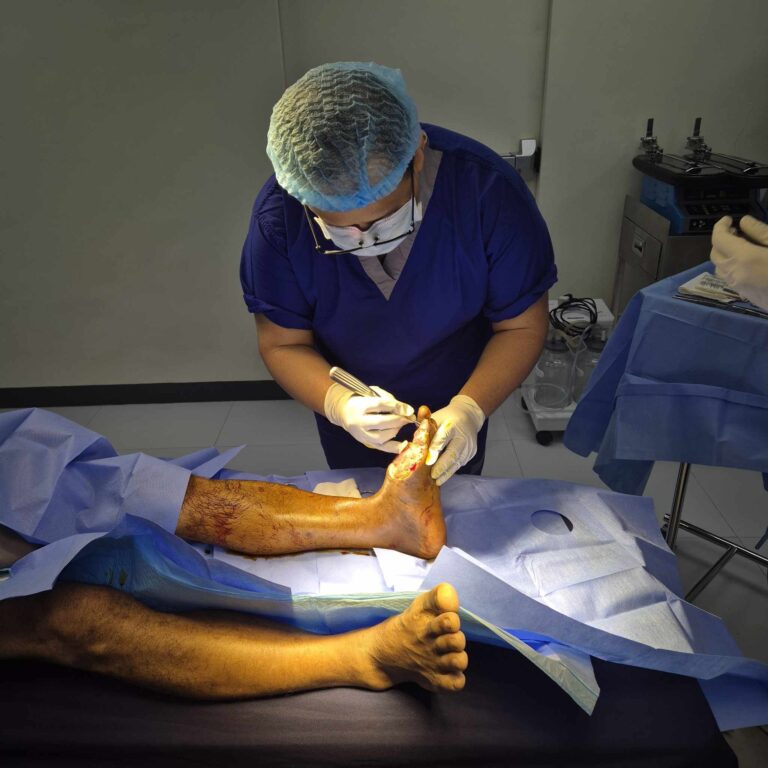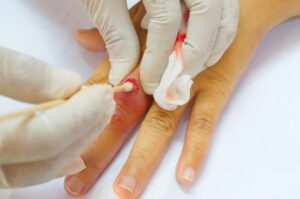Wounds can be more than just skin deep. When left untreated or improperly managed, wounds—especially chronic or severe ones—can lead to serious complications such as infections or delayed healing. Surgical debridement is a critical medical procedure designed to promote faster, safer wound healing by removing dead or infected tissue. At Kalingap Wound Care Clinic, this advanced treatment is delivered with a compassionate, patient-centered approach grounded in Filipino values of kalinga (care) and lingap (nurture), ensuring that healing addresses both the physical wound and the person behind it.
What is Surgical Debridement?
Surgical debridement is a medical procedure where a healthcare professional carefully removes necrotic (dead), infected, or damaged tissue from a wound. This process helps to create a clean wound bed, which is essential for optimal healing and tissue regeneration. Unlike other types of debridement such as enzymatic (using chemical agents), mechanical (physical removal), or autolytic (using the body’s own enzymes), surgical debridement involves precise, sometimes sharp removal using surgical instruments like scalpels or scissors.
Surgical debridement is often necessary for wounds that are large, deep, or have significant dead tissue, such as diabetic ulcers, pressure sores, traumatic injuries, or infected post-surgical wounds. By removing unhealthy tissue, it reduces the risk of infection and sets the stage for the body’s natural healing processes to work more effectively.
The Surgical Debridement Procedure
The procedure usually begins with an assessment by a skilled wound care specialist who determines the extent of necrosis and infection. After ensuring the patient’s comfort—sometimes under local anesthesia—surgical debridement is performed by carefully excising the dead tissue layer by layer. This process must be thorough yet gentle to avoid damaging healthy tissue.
At Kalingap Wound Care Clinic, advanced medical technology supports the precision of surgical debridement. Our experienced medical team works diligently to minimize pain and discomfort during the procedure, adhering to strict infection control standards to protect patient safety. The goal is always to prepare the wound for faster healing and prevent further complications.
Benefits of Surgical Debridement
Surgical debridement offers multiple benefits, making it an essential tool in effective wound management:
- Accelerates Healing: Removing dead tissue allows healthy cells to regenerate and repair damaged areas more efficiently.
- Reduces Infection Risk: Necrotic tissue can harbor harmful bacteria, increasing the chance of infection. Debridement eliminates this breeding ground.
- Promotes Better Outcomes: A clean wound bed responds better to additional treatments such as dressings, topical medications, or skin grafts if needed.
- Prevents Complications: By halting the spread of infection and removing harmful tissue, it lowers the risk of more serious health issues.
Holistic Wound Care at Kalingap Wound Care Clinic
At Kalingap Wound Care Clinic, surgical debridement is not just about cutting away dead tissue—it is part of a comprehensive, holistic approach to wound care. Guided by the Filipino values of kalinga and lingap, our clinic blends advanced medical treatment with genuine compassion and respect for every patient.
We understand that a wound affects more than just the skin—it impacts a person’s dignity, mobility, and quality of life. That’s why our patient-centered care focuses on the whole individual, offering support, education, and empowerment alongside medical treatment. We are especially dedicated to serving underserved communities in Metro Manila, striving to make expert wound care accessible to all.
Who Can Benefit from Surgical Debridement?
Surgical debridement is effective for a variety of wounds, including:
- Chronic wounds: Long-lasting wounds such as diabetic foot ulcers or venous leg ulcers.
- Pressure sores: Also known as bedsores or decubitus ulcers, common in bedridden or immobile patients.
- Traumatic wounds: Injuries caused by accidents or surgery that have developed dead or infected tissue.
- Infected wounds: Wounds with signs of infection where dead tissue is preventing healing.
Patients with conditions such as diabetes, poor circulation, or compromised immune systems are often at higher risk for wounds that require surgical debridement. Elderly individuals and those recovering from surgery or injuries also benefit from this treatment to prevent complications and restore mobility.
Aftercare and Recovery
Successful surgical debridement is only the first step toward healing. Proper aftercare is vital to maintain wound cleanliness and prevent infection. This includes:
- Regular wound cleaning and dressing changes as advised by the healthcare team.
- Monitoring for signs of infection such as increased redness, swelling, or discharge.
- Maintaining good nutrition and hydration to support tissue repair.
- Managing underlying health conditions like diabetes to prevent wound recurrence.
- Attending follow-up appointments for wound assessment and ongoing care.
Kalingap Wound Care Clinic provides detailed aftercare instructions and continuous support to patients, ensuring that recovery is as smooth and effective as possible.
Common Myths and FAQs About Surgical Debridement
Many people have concerns or misconceptions about surgical debridement. Clearing these up can help reduce fear and encourage timely treatment:
- Is surgical debridement painful? Patients may feel some discomfort, but local anesthesia or sedation is used to minimize pain during the procedure.
- Will surgical debridement leave a large scar? The procedure focuses on removing dead tissue and preserving healthy skin, which often leads to better cosmetic and functional outcomes.
- Can wounds heal without debridement? Some wounds may heal naturally, but when dead or infected tissue is present, surgical debridement significantly improves healing chances.
- Is surgical debridement risky? When performed by skilled professionals in a controlled environment, it is generally safe with minimal complications.
Why Choose Kalingap Wound Care Clinic?
Choosing the right clinic for surgical debridement can make a significant difference in healing outcomes. Kalingap Wound Care Clinic stands out for its:
- Commitment to Quality: We use the latest medical techniques and equipment to provide effective surgical debridement.
- Patient-Centered Approach: Every treatment plan is tailored to the individual, focusing on physical and emotional well-being.
- Filipino Values: Our care is rooted in kalinga and lingap, ensuring patients are treated with respect, compassion, and dignity.
- Accessibility: We serve diverse communities in Metro Manila, making advanced wound care available to those who need it most.
Patients consistently report feeling empowered and supported throughout their healing journey at Kalingap.
Takeaway
Surgical debridement is a powerful and often necessary step in the path to healing complex wounds. By removing dead and infected tissue, it creates an environment where the body can repair itself more effectively, preventing infections and reducing complications. Kalingap Wound Care Clinic offers surgical debridement within a holistic, compassionate framework that honors the whole person and is deeply rooted in Filipino values.
If you or a loved one is dealing with a stubborn wound, consulting with experts at Kalingap can help you take the right steps toward healing and restored quality of life. Reach out today to learn more about our services and how surgical debridement can be part of your recovery journey.






